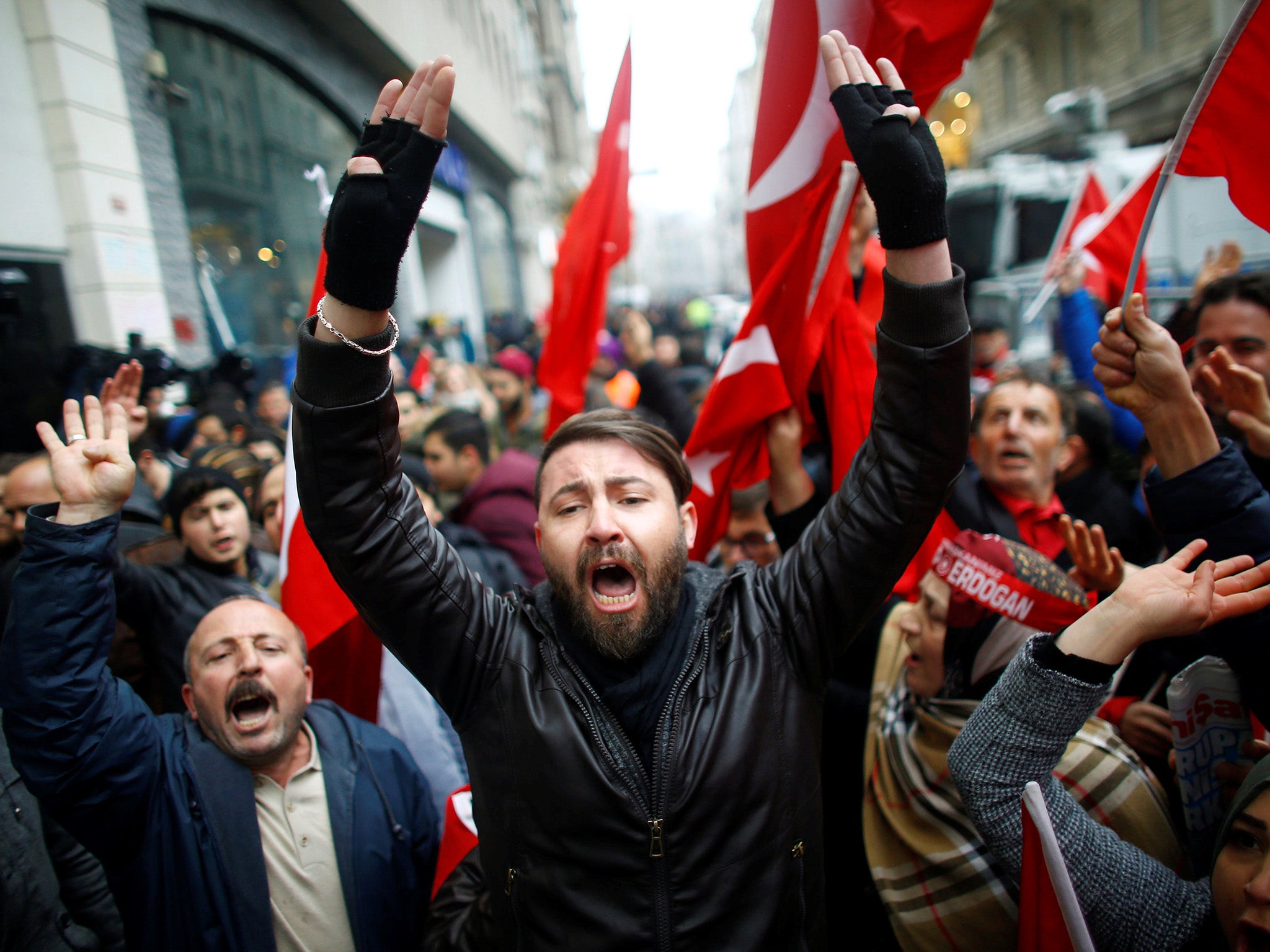Turkey threatens severe retaliation against the Netherlands as diplomatic crisis escalates
Dutch Prime Minister Mark Rutte condemns 'bizarre, irresponsible and unacceptable' behaviour

Riot police using mounted charges and water cannons to disperse protestors in Rotterdam; a Turkish minister expelled after trying to enter her country’s consulate in the city; Ankara expressing outrage and threatening severe retaliation. The diplomatic crisis between the Netherlands and the government of Recep Tayyip Erdogan, which has blown up so suddenly continues to escalate swiftly.
There is no sign at present of the situation defusing. In Ankara, Prime Minister Binali Yildirim reiterated that “strong countermeasures” will be taken. The homes of the Dutch ambassador and senior diplomats were sealed off in what was described as security measures.
In the Hague, the Netherlands Prime Minister, Mark Rutte, condemned Turkey’s behaviour as “bizarre, irresponsible and unacceptable.”
The current confrontation started with the refusal of the Dutch government to allow Mevlüt Cavusoglu, the Turkish foreign minister, to come to the country in order to address a campaign rally in support of President Erdogan in Turkey’s referendum next month.
However, the Turkish family affairs minister, Fatma Betül Sayan Kaya, arrived unannounced, to be detained and then expelled amid recriminations and accusations.
The referendum in question is about concentrating sweeping new powers into the hands of Mr Erdogan, a process which started in the aftermath of last year’s attempted coup. The opposition is effectively hamstrung with MPs, journalists and activists among those detained.
Kemal Kilicdaroglu, the leader of the largest opposition party CHP, complained: “This is definitely not going to be a fair referendum. We know that the pro-Erdogan media will have a broadcasting policy that completely ignores the opposition. It will be presented as if we are running against the state,” he warned.
But the outcome remains uncertain and the President’s camp claim there is a concerted campaign to attempt to deny him victory with a “foreign hand” playing a part – a supposed threat which has been much discussed attempt to seize power by, allegedly, the followers of Fethullah Gulen, the exiled cleric living in the US.
There are 5.5 million Turks living outside the country and the President needs their vote to make sure he wins. However, attempts by his supporters to hold rallies have been blocked by the authorities in some western European countries, mainly citing security reasons.
This has led to Mr Erdogan accusing Germany of “reverting to fascism” and the Dutch to “Nazi remnants”. The foreign minister, Mr Cavusoglu, speaking in Hamburg last week, held the German government was “applying systematic unacceptable pressure on our citizens”.
He was speaking at the home of the consul-general after a rally on the referendum was blocked from its original venue by the authorities.
Today, in response to the Dutch measures he declared: “What steps they take, we will take ten times more action. We are not afraid of this, but their doings are really inhuman.”
Turkey is not the only party in this impasse to be guided to a large extent by domestic political considerations. Elections are due to take place in the Netherlands, France and Germany, in which nationalist parties are expected to do well, and taking a tough stance against Muslim Turkey may be regarded by governments to be strategically advantageous in trying to stem the right-wing advance.
Mr Rutter has noticeably hardened his language about immigrants and refugees with elections due there on Wednesday.
The far-right leader Geert Wilders, whose campaign has been flagging, has seized on what has happened. “The Netherlands can see that these people are Turks, not Dutch” he said. “They have Dutch passports but they do not belong here.”
The mayor of Rotterdam, Ahmed Aboutaleb, held a press conference in the early hours of this morning to stress that Ms Sayan Kaya has been asked to leave the country after the Turkish consul-general gave him false assurance that the minister would not be going to the consulate.
“He lied flat out. He called on people to come to the consulate where the minister would be giving a speech”, he stated.
Mr Aboutaleb, a Muslim, and a member of the Labour Party, has been the mayor of the city since 2009 and had served previously in the government as the secretary of state for social affairs.
What has been raised in the standoff between Turkey and the Netherlands gives a glimpse of the pressures inclusive Western liberal democracy faces in these febrile political times in which race and religion have become issues to be exploited.
Join our commenting forum
Join thought-provoking conversations, follow other Independent readers and see their replies
Comments
Bookmark popover
Removed from bookmarks